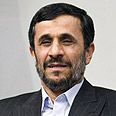
Report: Iran rejects nuclear deal
While details of official Iranian response to UN-drafted nuclear deal remain undisclosed, New York Times cites Western diplomats as saying Iran's objection to export uranium is 'basically refusal' of deal
Iran rejected the UN-drafted nuclear deal proposed a week-and-a-half ago, the New York Times reported, citing American and European diplomatic sources.
Iran gave its official response to the IAEA on Thursday, but its details were not made public. According to the proposal, Iran would ship out its stockpile of uranium to have it enriched abroad.
According to the diplomatic sources, the Iranians refused to go along with the main clause of the draft agreement: A provision that would have required the country to send about 75% of its stockpile of low-enriched uranium to Russia to be processed and returned to Tehran.
A senior European official told the paper that the Iranian response was “basically a refusal.” He said the Iranians wish to keep all of their uranium in the country until purchasing fuel from the West for the reactor in Tehran.
“The key issue is that Iran does not agree to export its lightly enriched uranium,” the official said. “That’s not a minor detail. That’s the whole point of the deal.”
American officials said they believed the deal would buy them a year or so to reach a broader nuclear agreement, which they hoped would also defuse chances that Israel may try to strike the Islamic Republic's nuclear facilities.
The Obama administration expected Iran to reject the deal, and in recent days International Atomic Energy Agency chief Mohamed ElBaradei made secret trips to Washington to discuss how to move forward if this does happen.
American officials said it was unclear whether Iran’s response was its final position, or whether it was seeking to renegotiate the deal — a step the Americans said they would not take.
Michael Hammer, a spokesman for the National Security Council, said that “we await clarification of Iran’s response,” but that the United States was “unified with our Russian and French partners” in support of the agreement reached in Vienna. That agreement explicitly called for Iran to ship 2,600 pounds of low-enriched uranium to Russia by January 15, according to officials who have seen the document, which has never been made public.










